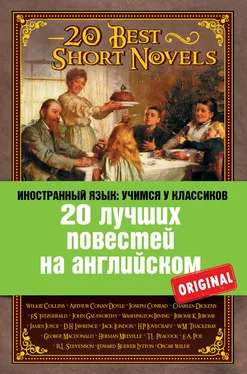He brought letters of introduction from his friend Folko of Heydenbraten, the Grand Master of the Knights of Saint John [800], to the venerable Baldomero de Garbanzos, Grand Master of the renowned order of Saint Jago [801]. The chief of Saint Jago’s knights paid the greatest respect to a warrior whose fame was already so widely known in Christendom; and Ivanhoe had the pleasure of being appointed to all the posts of danger and forlorn hopes that could be devised in his honor. He would be called up twice or thrice in a night to fight the Moors: he led ambushes, scaled breaches, was blown up by mines; was wounded many hundred times (recovering, thanks to the elixir, of which Wamba always carried a supply); he was the terror of the Saracens, and the admiration and wonder of the Christians.
To describe his deeds, would, I say, be tedious; one day’s battle was like that of another. I am not writing in ten volumes like Monsieur Alexandre Dumas, or even in three like other great authors. We have no room for the recounting of Sir Wilfrid’s deeds of valor. Whenever he took a Moorish town, it was remarked, that he went anxiously into the Jewish quarters and inquired amongst the Hebrews, who were in great numbers in Spain, for Rebecca, the daughter of Isaac. Many Jews, according to his wont, he ransomed, and created so much scandal by this proceedings and by the manifest favor which he showed to the people of that nation, that the Master of Saint Jago remonstrated with him, and it is probable he would have been cast into the Inquisition and roasted, but that his prodigious valor and success against the Moors counterbalanced his heretical partiality for the children of Jacob.
It chanced that the good knight was present at the siege of Xixona in Andalusia, entering the breach first, according to his wont, and slaving, with his own hand, the Moorish lieutenant of the town, and several hundred more of its unbelieving defenders. He had very nearly done for the Alfaqui, or governor – a veteran warrior with a crooked scimitar and a beard as white as snow – but a couple of hundred of the Alfaqui’s bodyguard flung themselves between Ivanhoe and their chief, and the old fellow escaped with his life, leaving a handful of his beard in the grasp of the English knight. The strictly military business being done, and such of the garrison as did not escape put, as by right, to the sword, the good knight, Sir Wilfrid of Ivanhoe, took no further part in the proceedings of the conquerors of that ill-fated place. A scene or horrible massacre and frightful reprisals ensued, and the Christian warriors, hot with victory and flushed with slaughter, were, it is to be feared, as savage in their hour of triumph as ever their heathen enemies had been.
Among the most violent and least scrupulous was the ferocious Knight of Saint Jago, Don Beltran de Cuchilla y Trabuco y Espada y Espelon. Raging through the vanquished city like a demon, he slaughtered indiscriminately all those infidels both sexes whose wealth did not tempt him to a ransom, or whose beauty did not reserve them for more frightful calamities than death. The slaughter over, Don Beltran took up his quarters in the Albaycen, where the Alfaqui had lived who had so narrowly escaped the sword of Ivanhoe; but the wealth, the treasure, the slaves, and the family of the fugitive chieftain, were left in possession of the conqueror of Xixona. Among the treasures, Don Beltran recognized with a savage joy the coat-armors and ornaments of many brave and unfortunate companions-in-arms who had fallen in the fatal battle of Alarcos. The sight of those bloody relics added fury to his cruel disposition, and served to steel a heart already but little disposed to sentiments of mercy.
Three days after the sack and plunder of the place, Don Beltran was seated in the hall-court lately occupied by the proud Alfaqui, lying in his divan, dressed in his rich robes, the fountains playing in the centre, the slaves of the Moor ministering to his scarred and rugged Christian conqueror. Some fanned him with peacocks’ pinions, some danced before him, some sang Moor’s melodies to the plaintive notes of a guzla, one – it was the only daughter of the Moor’s old age, the young Zutulbe, a rosebud of beauty – sat weeping in a corner of the gilded hall: weeping for her slain brethren, the pride of Moslem chivalry, whose heads were blackening in the blazing sunshine on the portals without, and for her father, whose home had been thus made desolate.
He and his guest, the English knight Sir Wilfrid, were playing at chess, a favorite arrangement with the chivalry of the period, when a messenger was announced from Valencia, to treat, if possible, for the ransom of the remaining part of the Alfaqui’s family. A grim smile lighted up Don Beltran’s features as he bade the black slave admit the messenger. He entered. By his costume it was at once seen that the bearer of the flag of truce was a Jew – the people were employed continually then as ambassadors between the two races at war in Spain.
‘I come,’ said the old Jew (in a voice which made Sir Wilfrid start), ‘from my lord the Alfaqui to my noble señor, for the ransom the invincible Don Beltran de Cuchilla, to treat of the Moor’s only daughter, the child of his old age and the pearl of his affection.’
‘A pearl is a valuable jewel, Hebrew. What does the Moorish dog bid for her?’ asked Don Beltran, still smiling grimly.
‘The Alfaqui offers 100,000 dinars, twenty-four horses with their caparisons, twenty-four suits of plate-armor, and diamonds and rubies to the amount of 1,000,000 dinars.’
‘Ho, slaves!’ roared Don Beltran, ‘show the Jew my treasury of gold. How many hundred thousand pieces are there?’ And ten enormous chests were produced in which the accountant counted 1,000 bags of 1,000 dirhems each, and displayed several caskets of jewels containing such a treasure of rubies, smaragds, diamonds, and jacinths, as made the eyes of the aged ambassador twinkle with avarice.
‘How many horses are there in my stable?’ continued Don Beltran; and Muley, the master of the horse, numbered three hundred fully caparisoned; and there was, likewise, armor of the richest sort for as many cavaliers, who followed the banner of this doughty captain.
‘I want neither money nor armor,’ said the ferocious knight; ‘tell this to the Alfaqui, Jew. And I will keep the child, his daughter, to serve the messes for my dogs, and clean the platters for my scullions.’
‘Deprive not the old man of his child,’ here interposed the Knight of Ivanhoe: ‘bethink thee, brave Don Beltran, she is but an infant in years.’
‘She is my captive, Sir Knight,’ replied the surly Don Beltran; ‘I will do with my own as becomes me.’
‘Take 200,000 dirhems,’ cried the Jew; ‘more! – anything! The Alfaqui will give his life for his child!’
‘Come hither, Zutulbe! – come hither, thou Moorish pearl!’ yelled the ferocious warrior; ‘come closer, my pretty black-eyed hour of heathenesse! Hast heard the name of Beltran de Espada y Trabuco?’
‘There were three brothers of that name at Alarcos, and my brothers slew the Christian dogs!’ said the proud young girl, looking boldly at Don Beltran, who foamed with rage.
‘The Moors butchered my mother and her little ones, at midnight, in our castle of Murcia,’ Beltran said.
‘Thy father fled like a craven, as thou didst, Don Beltran!’ cried the high-spirited girl.
‘By Saint Jago, this is too much!’ screamed the infuriated nobleman; and the next moment there was a shriek, and the maiden fell to the ground with Don Beltran’s dagger in her side.
‘Death is better than dishonor!’ cried the child, rolling on the blood-stained marble pavement. ‘I – I spit upon thee, dog of a Christian!’ and with this, and with a savage laugh, she fell back and died.
Читать дальше
Конец ознакомительного отрывка
Купить книгу












